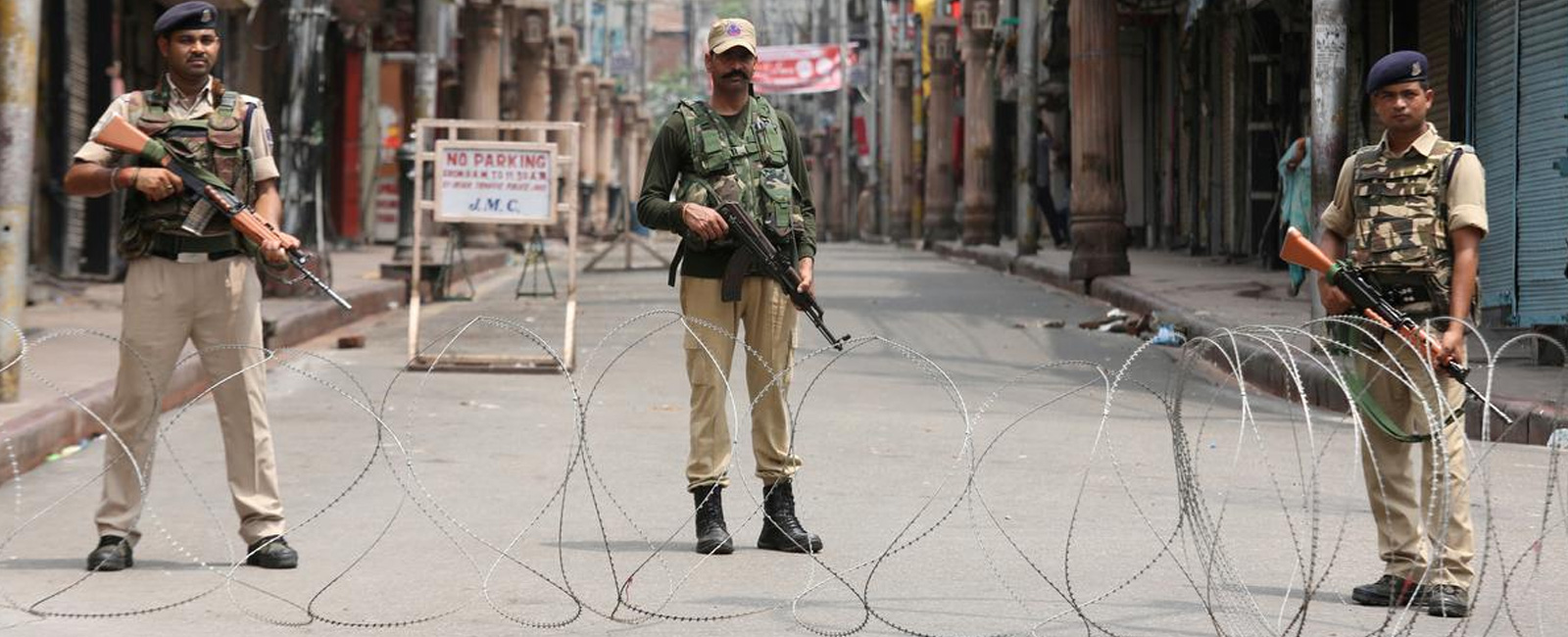India's annexation of IOJK: A timeline of events that transpired post August 5
India remains adamant on its stance over the Himalayan-region, New Delhi has paid almost no attention to international condemnation

India attempted to illegally annex occupied Kashmir on August 5, inviting international condemnation and human rights watchdogs demanding New Delhi reverse its decision.
However, New Delhi has remained adamant on its stance and has imposed restrictions and communications blackout repeatedly in the Himalayan-region ever since it revoked its special status.
Here's a timeline of the events that transpired after the annexation of occupied Kashmir:
August 5, 2019: India revokes IOJK’s special status, imposing a security clampdown and communications blackout in the disputed valley.
August 6, 2019: Amnesty International warns India that its decision to change occupied Kashmir's status will pave the way for increased violence.
August 6, 2019: UN Secretary-General António Guterres warns the world against rising tensions between nuclear-armed states, calls India’s move “dangerous and wrong”.
August 7, 2019: The Lok Sabha passes the Jammu and Kashmir Reorganisation Bill, 2019, with 367 votes for, 67 against and none abstaining — bringing the territory under its direct control.
August 8, 2019: Indian security forces arrest more than 500 people, including prominent politicians.
August 8, 2019: Pakistan’s joint parliamentary session passes a resolution condemning New Delhi's "illegal, unilateral, reckless, and coercive attempt to alter the disputed status of Indian occupied Kashmir as enshrined in the UNSC resolutions".
August 8, 2019: The National Security Committee downgrades Pakistan's diplomatic relations with New Delhi and suspends all bilateral trade.
August 8, 2019: Indian Prime Minister Narendra Modi says occupied Kashmir has been stripped of its autonomy to free it from “terrorism and separatism”, in his first address since stripping it of its special status.
August 11, 2019: Iranian President Hassan Rouhani expresses concern over "atrocities and killing of innocent people in occupied Jammu and Kashmir”.
August 12, 2019: Indian troops enforce tight restrictions on mosques for the Eid Ul Adha, fearing anti-government protests.
August 15, 2019: PM Imran warns Modi that any action by New Delhi against Islamabad would be countered with a stronger response.
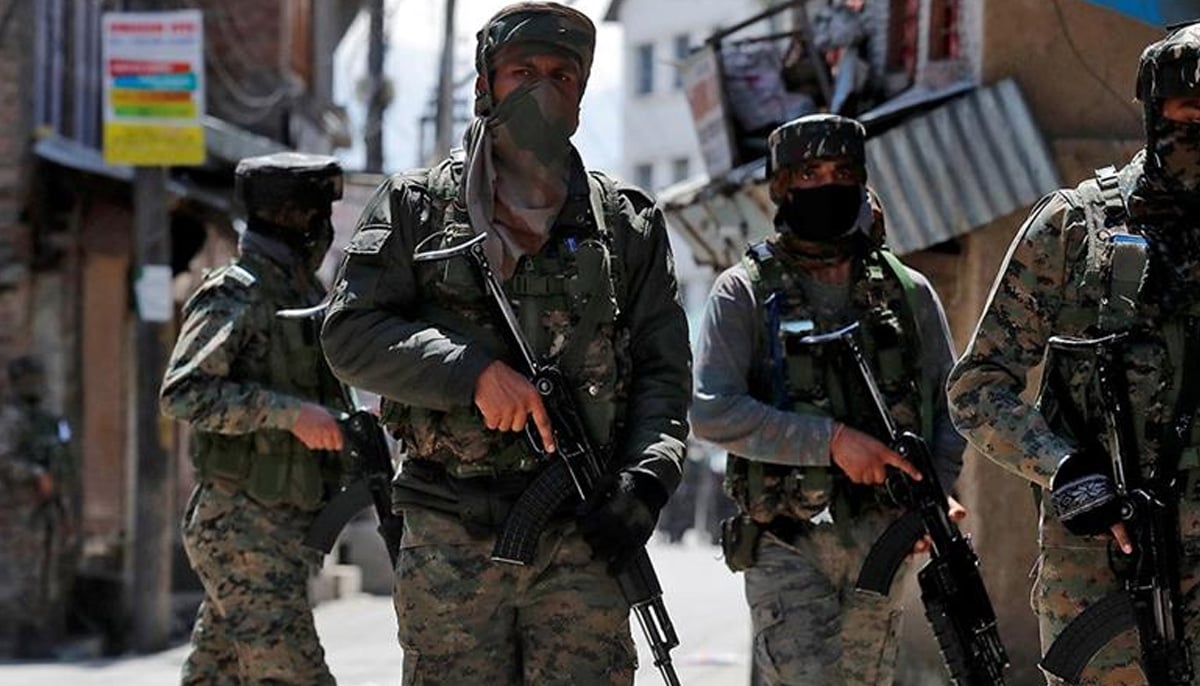
August 16, 2019: The United Nations Security Council (UNSC) holds a consultative meeting to discuss the Kashmir issue in nearly 50 years and expresses concerns over human rights violations in the region.
August 18, 2019: An official says that at least 4,000 people had been arrested and held under the Public Safety Act (PSA) since New Delhi stripped the restive region of its autonomy.
August 20, 2019: Indian security forces detain 30 people overnight in Srinagar, seeking to keep a tight lid on protests over the Bharatiya Janata Party government’s decision.
August 20, 2019: Pakistan announces to take Kashmir dispute with India to the International Court of Justice.
August 21, 2019: America’s Congressman Adam Smith, Chairman of the House Armed Services Committee, calls India’s US ambassador and informs him that he was monitoring the situation of Kashmir.
August 23, 2019: A group of UN human rights experts urge India to end communications blackout imposed in Kashmir, warning it amounted to “collective punishment”.
August 24, 2019: Occupied Kashmir’s administration sends back a delegation of India’s top opposition leaders, including former Congress president Rahul Gandhi, shortly after they land in Srinagar.
August 25, 2019: Modi receives the United Arab Emirates’ highest civilian honour.
August 26, 2019: Trump says India and Pakistan can handle their dispute over occupied Kashmir on their own, but he was there should they need him.
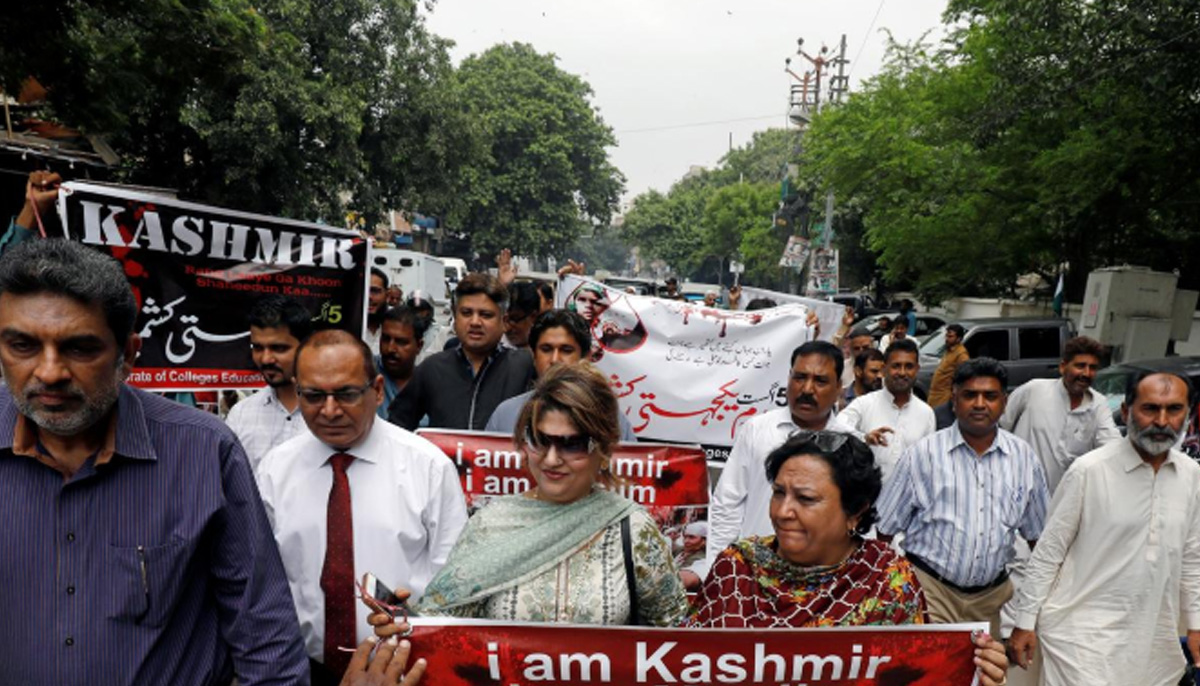
August 26, 2019: United States congresswoman Ilhan Omar calls for "de-escalation" and an "immediate restoration of communication" in occupied Kashmir.
August 28, 2019: Indian Supreme Court issues notice to the Centre on all petitions challenging the revocation of Article 370.
August 28, 2019: At least 500 incidents of protest broke out in occupied Kashmir since it was stripped of its autonomy, a senior government source informs AFP.
September 04, 2019: The Organisation of Islamic Cooperation's human rights commission condemns the continuation of the "inhuman curfew and communication blackout" in occupied Kashmir.
September 06, 2019: Indian authorities arrest political leader Shehla Rashid, under sedition charges over her tweets in which she had slammed the Indian armed forces.
September 16, 2019: PM Imran urges international community to play their role in resolving the Kashmir issue and warns them that it carries the potential of triggering a nuclear war.
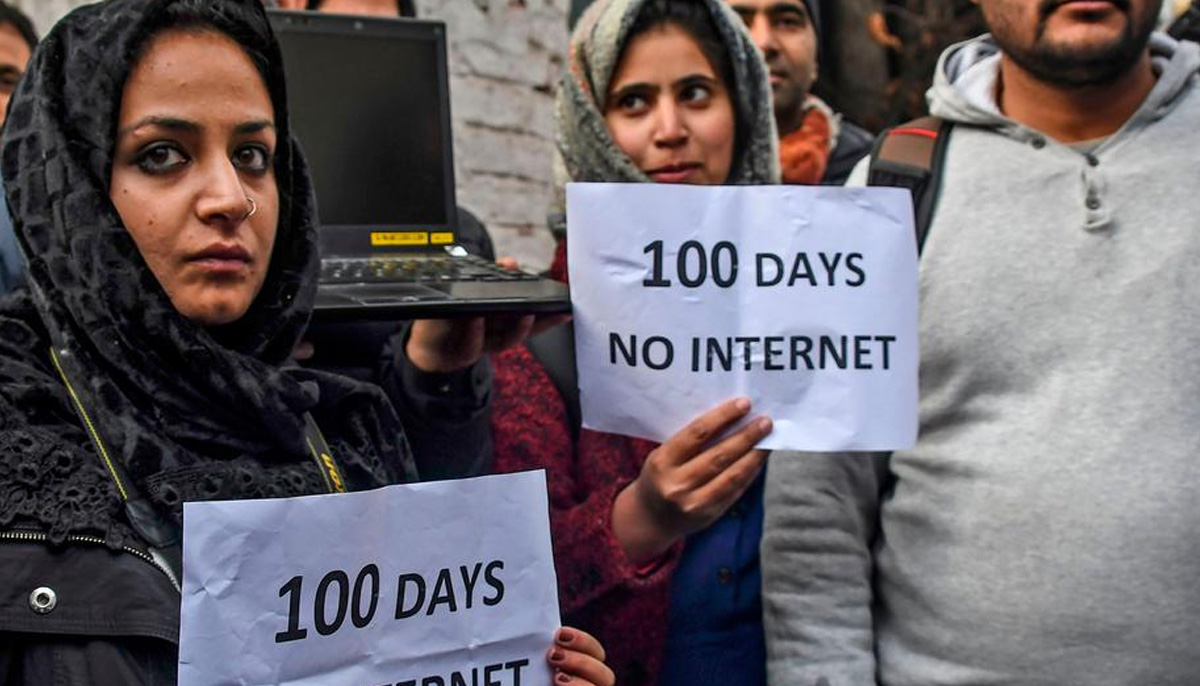
September 16, 2019: Government official informs AFP that the region has seen an average of 20 protests per day against Indian rule over the last six weeks.
September 27, 2019: PM Imran addresses the United Nations General Assembly (UNGA), drawing world attention to the emerging humanitarian crisis in Indian occupied Kashmir, among other issues.
September 27, 2019: PM Imran highlights the responsibility of the UN and the international community to take urgent steps to protect the people of occupied Kashmir.
September 28, 2019: Malaysian Prime Minister Mahathir Mohamad notes that despite UN resolutions on Kashmir, the territory has been invaded and occupied.
October 1, 2019: India's Supreme Court grants the government four weeks to file its response to several petitions challenging the revocation of occupied Kashmir’s special status.
October 10, 2019: Former permanent representative of Pakistan at the UN, Maleeha Lodhi, tells UN that life under India’s brutal occupation is to “live in an armed cage in the silence of a graveyard”.
October 14, 2019: India claims it has restored call facilities on post-paid cell phone connections in occupied Kashmir, after nearly 70 days, however, the ban on more than two million prepaid mobile connections and internet services will continue.
October 15, 2019: Police detain at least 12 women, including the sister and daughter of former occupied Kashmir chief minister Farooq Abdullah, for arranging an anti-India protest.
October 15, 2019: Text messaging services blocked in the region just hours after being restored when a truck driver was killed and his vehicle set ablaze.
October 22, 2019: Malaysia’s Mahathir Mohamad says he will not retract his criticism of New Delhi's actions in occupied Kashmir despite Indian traders calling for a boycott of Malaysian palm oil.
October 29, 2019: The UNHCHR expresses "extreme concern" over human rights abuses in occupied Kashmir and asks Indian authorities to "fully restore" human rights in the region.
November 13, 2019: Kashmir marked 100 days since India stripped the occupied valley of its autonomy and imposed a strict communications blackout, with local journalists protesting the internet ban.
November 19, 2019: The main trade body in the region says economic losses in the territory have run well over a billion dollars.
December 08, 2019: A bipartisan resolution moved in the US Congress urges India to end restrictions on communications and mass detentions in the region.
December 10, 2019: India allowed some incoming text messages into Kashmir, four months after they were first blocked.
December 19, 2019: A lockdown in Indian-held Kashmir has cost it's economy more than $2.4 billion, officials of the Himalayan region’s main trade organisation says.
December 30, 2019: Facebook blocks live streaming of Pakistan Broadcasting Corporation's news bulletins for highlighting continued atrocities, curfews, and military lockdown in Kashmir.
December 31, 2019: Indian authorities decide to restore text messaging services in the region, almost five months after the restrictions.
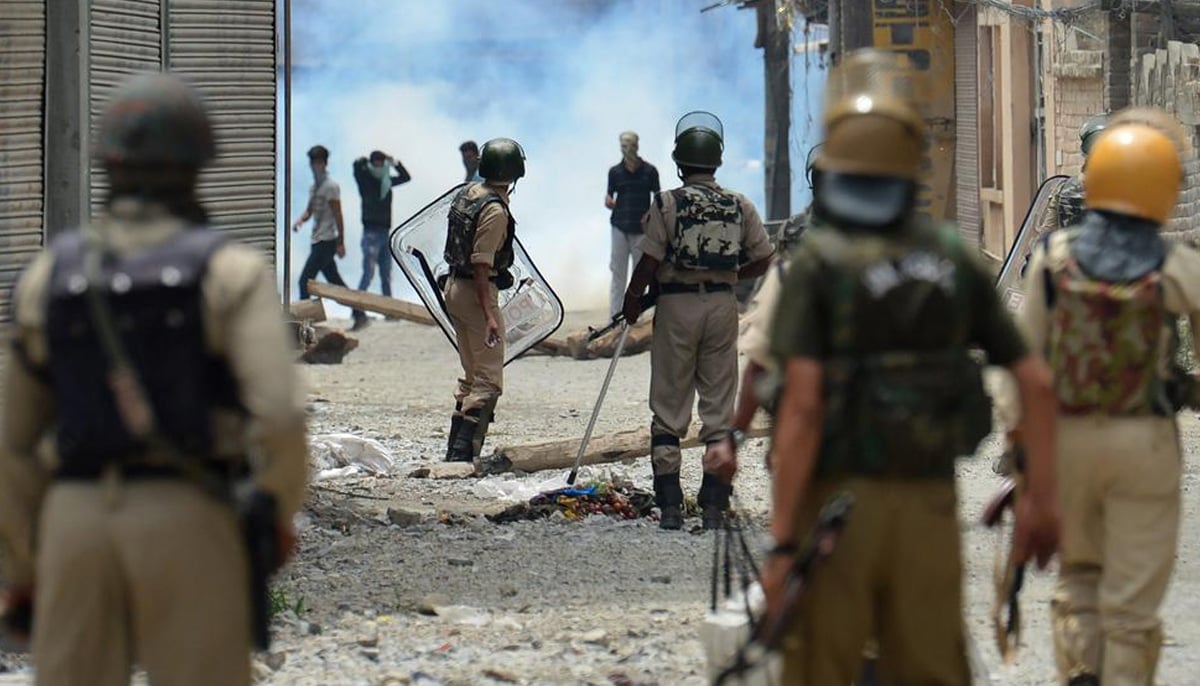
January 10, 2020: India's Supreme Court says freedom of the internet is a fundamental right and orders the administration to review all restrictive orders within a week.
January 15, 2020: Authorities in occupied Kashmir decide against fully restoring internet services, claiming that the move was necessary to curb "fake news" and to maintain the "sovereignty and integrity" of the country.
January 16, 2020: United Nations Security Council holds a meeting to review the situation in the valley.
January 17, 2020: India urges China to refrain from raising the Kashmir dispute at UNSC, claiming that it’s a bilateral matter.
January 18, 2020: Minister for Foreign Affairs Shah Mahmood Qureshi says the dream of a peaceful South Asia of the US and Pakistan cannot be realised until the Kashmir dispute is resolved, in a meeting with US Secretary of State Mike Pompeo.
February 05, 2020: The National Assembly unanimously passes a resolution calling for India to revoke the annexation of occupied Kashmir.
February 07, 2020: India extends detention of four political leaders in occupied Kashmir, including former Omar Abdullah and Mehbooba Mufti.
February 14, 2020: India plans to offer nearly 6,000 acres of land in occupied Kashmir as part of a business summit planned for April or May “to help” the disputed region.
February 14, 2020: Turkish President Recep Tayyip Erdogan reiterates his country's support for Pakistan’s stance on the Kashmir issue.
February 17, 2020: Debbie Abrahams, a Member of the British Parliament and the Chair of the All-Party Parliamentary Group for Kashmir, who has been highly critical of India’s move in the occupied valley, is denied entry into India.
February 18, 2020: India summons the Turkish ambassador to lodge a diplomatic protest over Erdogan's remarks on occupied Kashmir and warned it would have a bearing on bilateral ties.
February 18, 2020: British MP Abrahams says Pakistan's stance on Kashmir issue exhibited the country's openness and progressive approach to the dispute and hoped that India would "reciprocate".
March 04, 2020: Authorities in occupied Kashmir lift the ban on social media websites, after which people in the region were able to access unrestricted 2G internet access.
March 14, 2020: Indian authorities release Kashmiri lawmaker Farooq Abdullah, seven months after New Delhi stripped Kashmir of its status.
April 01, 2020: The Indian government announces a new set of laws for Indian-occupied Kashmir, including domicile rights for Indian citizens.
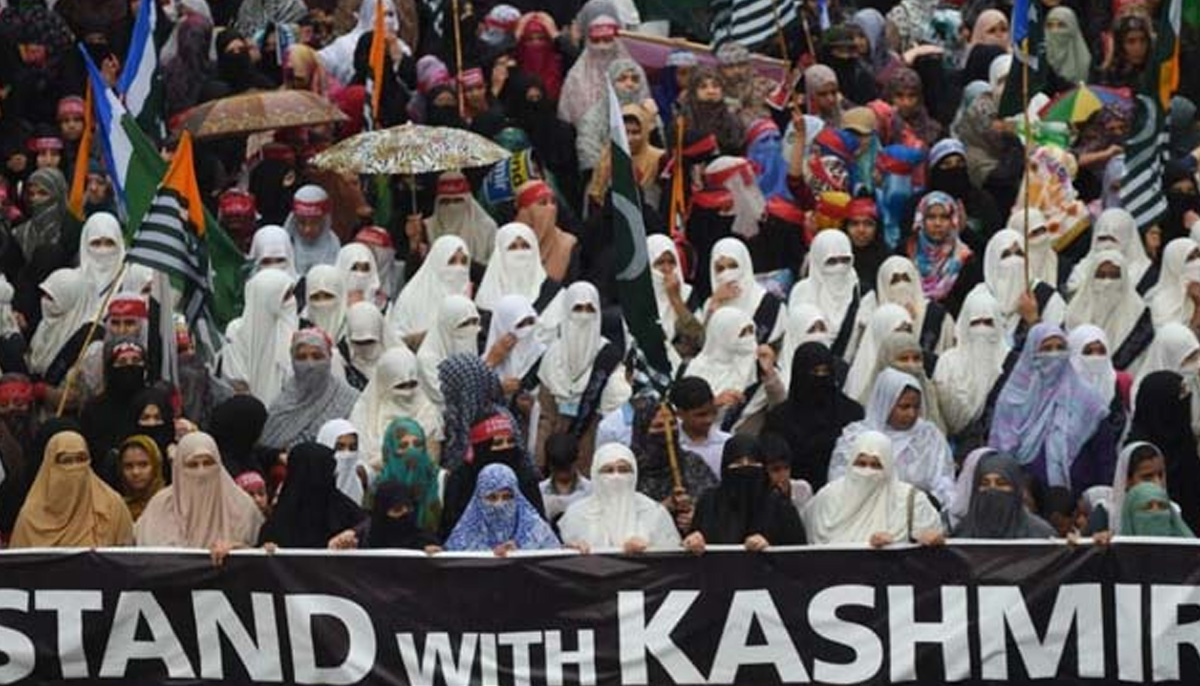
May 06, 2020: Indian troops martyr four Kashmiri fighters in occupied Kashmir, including the commander of the biggest separatist group of the region.
May 09, 2020: Anti-India protests and clashes continue for the third day in occupied Kashmir, following the killing of a top resistance leader.
July 01, 2020: Hundreds of people in occupied Kashmir staged protests, accusing government forces of killing an elderly man in front of his minor grandson during a gun battle with Kashmiri fighters.
July 09, 2020: UN special rapporteurs ask the Indian government to investigate the alleged torture and custodial killings of several Muslim men since January 2019.
August 01, 2020: FM Qureshi announces that Pakistan will mark August 5 as 'Yaum-e-Istehsal' day.
August 03, 2020: Pakistan renames Islamabad’s “Kashmir Highway” as “Srinagar Highway” to pay tributes to the struggles of the people occupied Kashmir.
August 04, 2020: Pakistan unveils new political map, including Indian-occupied Kashmir.



